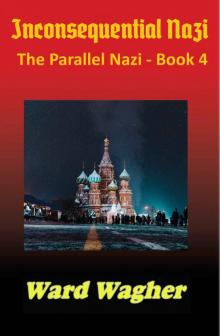- Home
- Ward Wagher
Threads of Despair: The Parallel Nazi - 6 Page 2
Threads of Despair: The Parallel Nazi - 6 Read online
Page 2
“And how is the great love of my life doing today?” Schloss asked as he slid into his chair.
“Oh, Hennie, I wonder if you might speak to Peter. When he is in his office, he spends much of his time staring at the walls.”
“I am not sure there is anything I might say to improve things, Gisela. The man lost his wife.” He stopped to shake his head. “And I lost a sister. And little Gratia lost her mother. We are all grieving.”
“I thought perhaps you could say something to shake him out of it.”
He frowned as he looked down at his desk. “I don’t know. Are we wise to encourage someone not to grieve?”
“I fear he may do something unwise.”
“His anchor is Gratia. She is his link back to Renate. These things take time. And I am not sure he would appreciate my interference.”
“Must you be so pragmatic?” she flared. “You men! Peter is so stoic, yet I know the grief is eating him up inside. It will destroy him.”
“It will not destroy him, Gisela. People have to work through their grief. It is excruciating, yet, it is part of life. We work through it and move on.”
“Move on?” she cried. “I don’t understand how you can be so cold. She was your sister!”
“Yes, she was. And losing her hurts badly. But neither Peter nor I can afford to collapse right now. The nation depends upon our collective wisdom. I don’t even want to think about the penalty for a bad decision right now.”
She jumped to her feet. You may be making a poor decision by letting Peter wallow in his guilt.”
“Guilt?”
“Why do you think he is this way? He is blaming himself for taking Renate to Frankfurt.”
Schloss snorted lightly. “It seems I remember you and Renate twisting my arm hard to take you two along on the trip. I don’t blame you for that, and neither does Peter.”
He stood up and walked over to her, placing his hands on her arms.
“Please, Gisela. Allow Peter the time to work through his feelings. There is plenty of guilt to go around. As far as I’m concerned, the ultimate blame lies with Stalin, and we will need to deal with that sooner or later.”
She broke free from his hands and walked quickly from the room. He sighed. For a few hours, he had been able to forget about the pain and guilt as he worked through the never-ending mountain of paperwork that flowed through his office. Without intending to, perhaps, Gisella had ripped away the scab from his wound.
He collapsed into his chair again and rubbed his eyes with his palms. When he looked up, the secretary stood in the office.
“What is it, Willem?”
“The Reichsmarshall and General Guderian are here and request a moment of your time. I really would have no problem telling them I can set an appointment.”
“No, Willem. If they thought it important enough to come over here, I should see them. Show them in.”
“Do you need anything first, Herr Reich Chancellor?”
“Since Frau Schloss was fussing around me, Willem?”
“Well… yes.”
“I am fine. Please send our guests in.”
Schloss refilled his coffee cup and took a sip. It was scorching, and he liked it that way. But, it did limit how quickly he could drain the cup. General Heinz Guderian and Reichsmarshall Erhard Milch walked quietly into the office and seated themselves across from Schloss. Kirche followed them in with a coffee service and a tray of pastries.
The secretary filled the two coffee cups and quietly withdrew.
“Good news, or bad, meine Herren?” Schloss began the meeting.
“It is not good news,” Milch stated, “although not unexpected.”
Schloss smiled. “Since you are not in a panic, I suppose we can assume the news is not as bad as it could be.”
“We had a Swallow crash-land behind the Russian lines, Herr Reich Chancellor,” Guderian said. “We had other aircraft overhead, and it appears the aircraft was intact. Also, the Russian captured the pilot.”
Schloss winced. “Not good news. But, as you said, this was hardly unexpected. We knew that sooner or later, the Russians would be able to get a good look at the plane. And we have been preparing for that day.”
“I am surprised you are so philosophical about it,” Guderian continued. “We didn’t need this.”
“No, we didn’t. But this is part of the reason I have insisted on developing our jet engines and aircraft. The B model is in production. And where are we at on the C model, Erhard?”
Milch cleared his throat. “Junkers has flight-tested the Jumo 005, the engine with the fan assembly on the front. The development has gone better than we expected. Messerschmidt hopes to have several prototypes flying in February. The new wing design is supposed to behave better as the aircraft approaches the speed of sound. We hope.”
“We hope,” Schloss repeated. “Has Colonel Gehlen made any progress in his organization on sowing disinformation about the airplane to the Russians?”
“Now that they have the aircraft, there is little we can say that will knock them off track,” Guderian said. “Fortunately, it was an A model that crashed. We think the pilot allowed himself to run out of fuel.”
“Not to tell you how to do your job, Erhard, but I assume the Swallow pilots will receive a strong warning about not outrunning their fuel supply.”
“Already taken care of, Herr Reich Chancellor.”
“Very well,” Schloss said. “According to the military digest, the Russians seem to be content to lick their wounds after we dissuaded them from crossing the Oder. Do you see anything else?”
“Rommel and I talk daily,” Guderian explained. “Smirnoff cannot sit for very long before Stalin replaces him. But he doesn’t have the supplies necessary for another offensive. And winter is settling in for them in Ukraine and Eastern Poland. We have done a decent job of interdicting their rail traffic, and the snows will bring the truck traffic to a complete halt soon if it hasn’t already done so.”
“Are we in a position to do something about that?” Schloss asked.
“It depends on whether we are willing to commit our reserves. Erhard and I have worked to improve our winter combat capabilities. I think this will come as a nasty surprise to the Russians.”
“Do you have a plan, then Heinz?”
Guderian smirked. “I always have plans. But, not for breaking through enemy lines.”
“After our last adventure,” Milch commented, “that seems wise.”
“Indeed,” Schloss agreed. “But, what can we do to make life miserable for the Russians?”
“What we are doing right now,” Guderian said. “Like it or not, we are in a war of attrition. Our main limitation right now is our supply of bombs. But, I think if we use them wisely, the Russians will be hungry come spring.”
“So you are not planning an offensive?” Schloss asked.
Guderian and Milch looked at each other. Guderian spoke again. “Being sadder and wiser, I recognize our prior offensive was an attempt to fight the Russians on their terms. Our original strategy was working… is working. We are bleeding them badly with the Luftwaffe. Our harassing attacks on the ground are bleeding with little or no losses to us.”
“But if they try to cross the Oder again?”
“Then we must do what we need to do to stop them. I suspect they will winter on the east bank of the Oder and then try to force another crossing after the spring floods.”
Schloss nodded. “If you two agree, then I approve the strategy. We have not really recovered from losing one-hundred-thousand men in Poland. It was a costly lesson, but I think we will learn well from it. Keep the Russians chasing their tails, meine Herren.
“I think we might accomplish that,” Milch said. “The Russians seem to want to use the biggest hammers. I want to make sure Stalin’s thumb is under one of those hammers.”
Guderian laughed. “Well said, Herr Reichsmarshall.”
Milch looked pleased with himself. Schloss winced inwardl
y. Milch was doing the job well from all accounts, but he seemed to exhibit hints of smugness, or perhaps an uncontrolled ego. He would bear watching.
Schloss stood up. “Meine Herren, thank you for coming here today. You were correct to do so. I am not sure we can do anything about the loss of the Swallow to the Russians. We knew it had to happen eventually. Be sure to tell Gehlen to watch for signs of Russian activity in aircraft development. If they manage to get a decent jet fighter into production, it will be unpleasant for us.”
The other two men also stood and nodded to Schloss and then left the office. Schloss picked up his half cup of cold coffee and set it on the tray next to the Thermos decanter. He picked up a fresh cup and filled it with the coffee. He set the cup on his desk and eased himself into the chair with a sigh. After sipping the hot coffee, he decided that he had little to complain about despite the horrific events over the past month.
The loss of Renate was grievous. And getting Peter back on an even keel would be tough. But, the Germans had rallied behind his government. He had good people working for him, even though he did not trust some of them. And the Wehrmacht was fighting a gigantic foe, probably as well as it was able.
After finishing the cup of coffee, he refilled it and returned to the report from Ribbentrop. Reading it would be hard work, but it contained things he needed to know. And perhaps he could take lunch with Gisela today.
CHAPTER THREE
November 1, 1943; 10 AM
German Foreign Ministry
Wilhelmstraße 73
Berlin, Germany
Peter Schreiber stared out the windows of his office. The stack of work on his desk was enormous, and he could not bring himself to start. He chastised himself for his laziness and wondered what had happened. He usually would have industriously worked through the papers and have most of the pending items cleared off by lunchtime. Getting the work done was necessary for him because he often spent his afternoons in the ministry of information, where he helped craft Germany’s propaganda.
He knew what drove his inability to concentrate – Renate’s death. They had been married for twelve years, and now she was gone. He lived the event over and over in his nightmares. In the blink of an eye, the ballroom floor erupted, blowing the walls out. The ceiling and the floors above collapsed down on them. Before he could even begin to think about shielding her from the onslaught, the falling structure and the rubble trapped him.
His friend, Karl Rainer, the Reichsprotektor, had come to the hospital. With a face graven from pale stone, Karl told him that Renate was gone. And it seemed to him that his world ended at that point. He hadn’t known how to move forward. He still didn’t.
Intellectually, he knew that the pain would fade over time. And he had to care for a daughter, Renate’s daughter. But, why did it hurt so? Yet, he did not surrender to the pain. That would not be honorable. He knew others who had lost loved ones. Why even his brother-in-law, Heinrich Schloss, had lost his first wife to cancer over two years ago. And he had never heard Schloss comment about his feelings.
His secretary, Max, stepped into the open doorway. “The Reichsprotektor is here and asks if you have a few moments, Herr Foreign Minister.”
Schreiber stood up and forced a smile. “Why not? Send him in.”
Rainer walked into the office carrying a box of pastries. Max followed with the coffee decanter on a tray, along with two small plates. The routine was set by now. Rainer had been visiting Schreiber’s office three times each week since the bombing.
Schreiber waved his friend over to the conversation nook and followed. When they were seated, Max filled the two cups with coffee and extracted the pastries. He made sure that the cream and sugar was near Rainer.
“What brings you over this way, Karl?” Schreiber asked, beginning the well-rehearsed conversation.
“I have found it good to have a morning constitutional. As I passed the bakery, I thought I’d add a little something to our repast.”
“And I’m glad you did. How goes the task of tracking down the enemies of the Reich?”
Rainer sipped his coffee and quirked a slight smile. “As usual, we have made no progress in tracking down the Munich faction. The Reich Chancellor and I sent Gerhard Wicklein to work in the party headquarters in Munich. Have I told you this? I’m not sure I remember.”
“No, this is the first I’ve heard of it. Wicklein is one of your people, isn’t he?”
“He was one of my people when I worked in the party offices. I have kept him clear of the SS. We sent him down to help Herr Zindanfel manage the offices.”
“And you have given him some unofficial taskings, right?”
Rainer smiled and nodded. “Correct. I would like very much to roll this gang up. I hate having to watch Herr Schloss’s back all the time, not to mention yours and mine.”
Schreiber shook his head sadly. “It doesn’t seem to matter how careful we all are; there are always people who will want to take advantage.”
“I wasn’t watching carefully enough, Peter. For that, you have my eternal regrets.”
“It is what it is, Karl. No man can be that vigilant. I suppose God can see everything. I know you believe that.”
“That is my daily prayer,” Rainer replied. “Sometimes, God acts in His ways, and we have to accept that.”
“Well, say a prayer for me. Life has been… unpleasant.”
“I don’t even know what to say to that.”
“Then don’t,” Schreiber said softly. “I appreciate you being here and not trying to say something trite. You will excuse me if I don’t feel favorably disposed to God right now.”
“I do understand that. To change the subject, has there been any further news from the Russians about getting thrown out of England?”
“Not other than for the first couple of days. They have gone quiet.”
“Not much is happening at the front, either.”
“Guderian thinks they are hunkered down for the winter,” Schreiber mused. “He views it as an opportunity.”
“As long as it’s not another opportunity like we had last summer.”
“Oh, mein Gott,” Peter sighed. “I still cannot believe we let that happen to us. I have to give Hennie credit for standing behind Schneller Heinz. I think I would have sacked him.”
Rainer set his coffee down and picked up the plate with the strudel. He nibbled on it as he thought.
“If you remember, I was pushing in that direction when the Reich Chancellor put his foot down. And he made a good point.”
Schreiber laughed. “Yes, he did. And I thought he was going to blow up at you.”
“I thought he was, too. Nevertheless, he was right. If we have smart generals, we need to let them learn from their mistakes. And Schneller Heinz is one of the smart ones.”
“And I’m not sure he made a mistake in this case. We all looked at what he proposed and agreed it made sense. Sometimes things just go against you.”
Rainer noticed Schreiber’s look of pain when he made his last statement and decided to ignore it.
“I don’t know, Peter. Heinz told me that he and Rommel got cocky and paid for it. He has since been adamant that we not play this game by the Russian rules. That’s a sure road to defeat.”
“We may get defeated, anyway,” Schreiber commented.
“True. But I don’t think we will. It is going to be a hard war, but I think the Soviet Union will ultimately collapse.”
“Seriously? We’ve been saying that since the war started in April. It hasn’t happened yet.”
“I said ultimately, Peter. I don’t know how long it will take, but their economic system just doesn’t hold water. Ribbentrop schooled me on Soviet economics. You cannot really manage a command economy on that scale. Oh, you can make it sort of work for a while. The Russians are pretty smart. But once the people lose confidence in the system, it will start rotting.”
“Quite the speech, Karl. Do you believe everything Ribbentrop tells you?”
r /> “No, of course not.” Rainer looked disgusted. “The problem with Joachim is that he usually doesn’t know when he’s lying. And he lies a lot. But, as he told the Reich Chancellor, Joachim does know how to make money. He has a native understanding of commerce, and he says the cracks are starting to show in the Russian system.”
“I hope he’s right,” Schreiber said. “And I hope it all falls apart before they capture Germany.”
“That’s where you and I are in perfect agreement. Now, what about the Americans?”
“I have a report that Ribbentrop will be presenting to the council this afternoon. Would you like to look at it?”
Rainer shook his head. “Just give me the Précis. I can read the report while Ribbentrop is droning on in the meeting. It’ll help me stay awake.”
“Don’t count on it. It’s pretty dry. Essentially, Ribbentrop is building a commercial organization to manage trade between the United States and us. He has been signing contracts with American companies as quickly as he is able. Because of their war with the Japanese, they cannot ship us as much as they would like, but the organization will smooth the way when the trade does happen.”
“Like with the ships and U-Boats?”
“Exactly,” Schreiber replied. “And they are buying a great load of ships and U-Boats. Hennie is pleased about all the gold that will flow back to Germany. Deutsche Bank has been getting nervous about the state of our gold reserves.”
“We have been successful in cutting down on the gold smuggling,” Rainer said. “Although, to be honest, since we let the price of gold float, it seems to be staying in the country.”
“And annoyed the Americans.”
“I suppose we can’t keep them happy one-hundred percent of the time.”
“I suppose they aren’t always delighted with us, either,” Rainer said.
“In general, we seem to get along with them surprisingly well. Especially considering that we were very close to going to war a couple of years ago.”

 The Mountains of Montora (The Chronicles of Montora Book 1)
The Mountains of Montora (The Chronicles of Montora Book 1) Nazi Magician: Inventor
Nazi Magician: Inventor The Last Paladin
The Last Paladin Inconsequential Nazi
Inconsequential Nazi Impossible Nazi
Impossible Nazi The Snows of Montora (The Chronicles of Montora Book 3)
The Snows of Montora (The Chronicles of Montora Book 3) The Margrave of Montora (The Chronicles of Montora Book 2)
The Margrave of Montora (The Chronicles of Montora Book 2) Gravity Rising (The Parallel Multiverse Book 2)
Gravity Rising (The Parallel Multiverse Book 2) ruBracks, Nazis, the Death of the Universe & Everything (The Parallel-Multiverse Book 1)
ruBracks, Nazis, the Death of the Universe & Everything (The Parallel-Multiverse Book 1) Improbable Nazi (Parallel Nazi Book 2)
Improbable Nazi (Parallel Nazi Book 2) Accidental Nazi
Accidental Nazi Improbable Nazi
Improbable Nazi